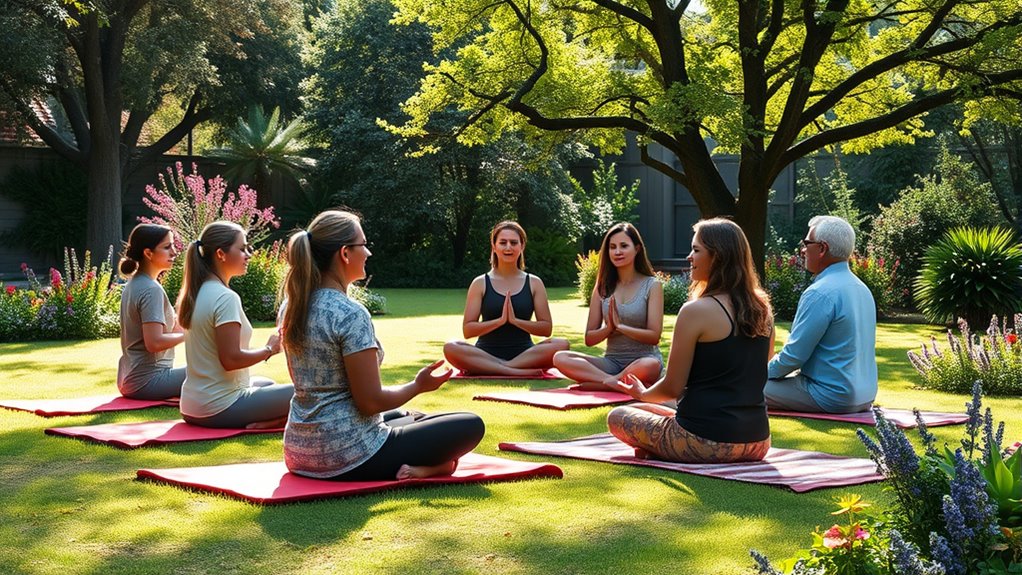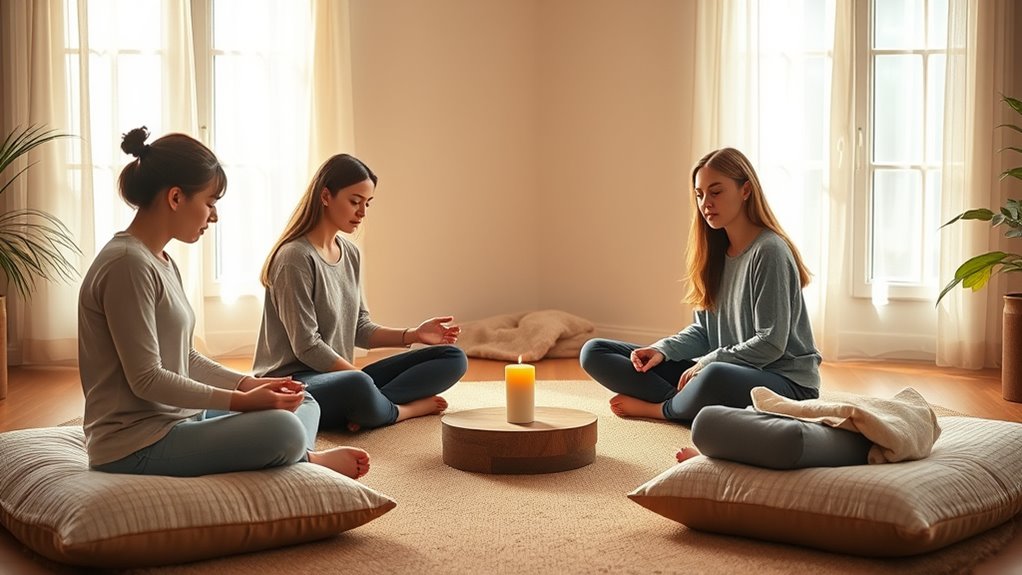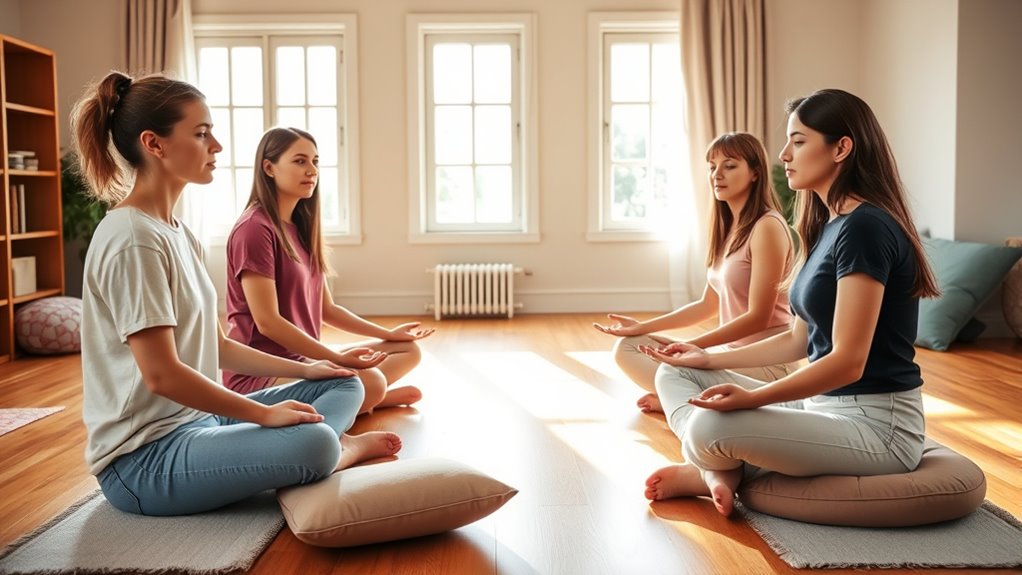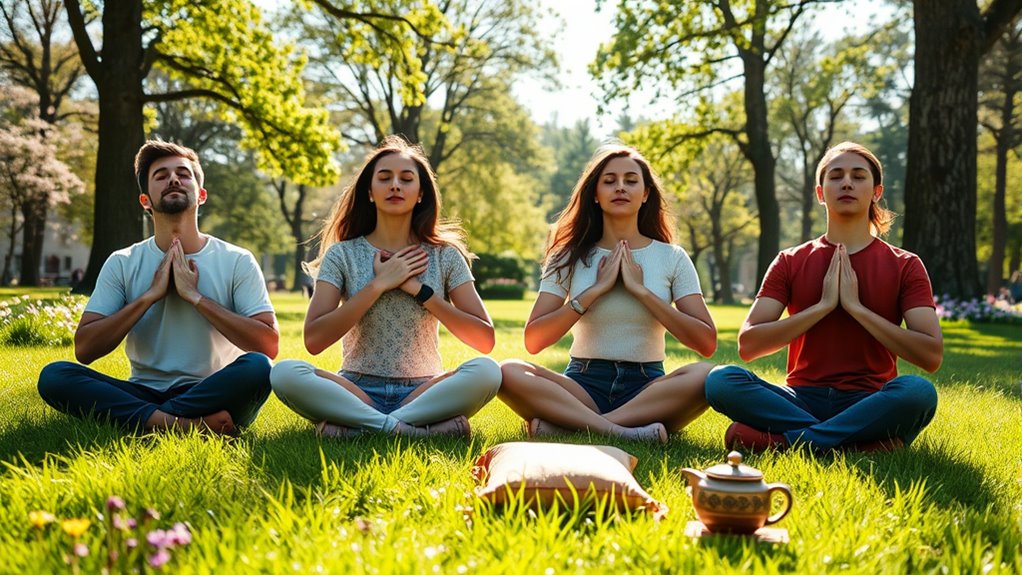Practicing mindfulness with friends is a great way to deepen your connection and stay consistent. You can do guided group meditation, focusing on your breath while sharing a calm environment. Try mindful listening sessions where you fully attend to each other’s words, cultivating empathy. Another option is collective body scan exercises, which enhance body awareness and group bonding. If you’re interested, there’s plenty more techniques you can explore to make mindfulness both fun and effective.
Key Takeaways
- Engage in guided group meditation sessions to foster shared focus and collective calm.
- Practice active listening and heartfelt sharing to deepen emotional awareness and empathy.
- Perform collaborative body scan exercises to promote group relaxation and body awareness.
- Incorporate mindful breathing exercises together to enhance presence and reduce stress.
- Reflect as a group on personal experiences and gratitude to strengthen bonds and mindfulness skills.
Guided Group Meditation Practices

Guided group meditation practices offer a structured way to experience mindfulness with others, making it easier to stay focused and committed. When trying meditation techniques in a group setting, you benefit from shared energy and collective calm. To maximize your experience, follow simple group mindfulness tips like maintaining a gentle focus on your breath and respecting others’ silence. The guide’s voice helps anchor your attention, reducing distractions and promoting consistency. Group meditation creates a supportive environment where you can feel motivated to practice regularly. Whether you’re new or experienced, participating in guided sessions improves your ability to remain present. Additionally, incorporating mindfulness exercises in education can enhance learning outcomes and foster emotional regulation. Remember, the key is consistency and openness, allowing the group’s energy to deepen your mindfulness journey.
Mindful Listening and Sharing Sessions

Building on the calm and focus cultivated during group meditation, mindful listening and sharing sessions invite you to deepen your practice through connection and openness. During these sessions, you focus fully on your friends’ words, cultivating emotional awareness and empathy. As you listen without judgment, you’ll notice subtle feelings and thoughts, strengthening your understanding of both yourself and others. Sharing your own experiences fosters vulnerability and trust, creating a safe space for gratitude sharing. This exchange not only nurtures emotional bonds but also enhances your mindfulness skills by encouraging present-moment awareness. Engaging in active listening helps you develop a greater capacity for compassion and understanding, which in turn can improve interpersonal relationships. Incorporating family dynamics into your reflection can provide deeper insight into your own patterns and responses, enriching your mindfulness journey. Eye patches can be incorporated into self-care routines to promote relaxation and rejuvenation, complementing the mindfulness practice. Additionally, practicing mindfulness in communication during these sessions can help you become more aware of your own reactions and biases, fostering deeper empathy and patience. By practicing active listening and heartfelt sharing, you develop a greater sense of compassion and appreciation, enriching your relationships and deepening your mindfulness journey.
Collaborative Body Scan Exercises

A collaborative body scan exercise invites you to connect with others by collectively bringing awareness to different parts of your bodies. You sit comfortably with your friends, coordinating your group breathing to deepen the shared experience. As you move through each body part, you notice the sensation of skin, muscles, and bones working together. Visualize your group sharing gratitude for this moment of mindfulness, strengthening your bond. Incorporating mindfulness practices like this can also enhance your understanding of body awareness and emotional well-being. This exercise encourages group cohesion, fostering a sense of unity and support among participants. Imagine:
- A circle of friends gently guiding each other’s awareness from head to toes
- Breathing in unison, creating a calming rhythm
- Feeling the warmth of shared gratitude radiate among you
- Sensing collective relaxation as tension melts away
Adding a focus on nutrient-rich ingredients can further amplify the benefits of group mindfulness exercises by promoting overall health and vitality.
Frequently Asked Questions
How Often Should I Practice Mindfulness Exercises With Friends?
You might wonder about mindfulness frequency, but there’s no one-size-fits-all answer. Practicing with friends can boost group practice benefits, making it more enjoyable and motivating. Ideally, aim for weekly or bi-weekly sessions to build consistency without feeling overwhelmed. Regular group practice helps deepen your mindfulness skills, enhances connection, and reduces stress. Listen to your needs and your friends’ schedules to find a rhythm that works best for everyone.
Can Mindfulness Activities Help Improve Our Friendship?
Mindfulness activities can definitely help improve your friendship by strengthening your bond. When you practice mindfulness together, you both experience benefits like increased empathy, better communication, and reduced stress. These mindfulness benefits foster deeper friendship bonding, making your connection more genuine and resilient. By sharing mindful moments, you create a supportive environment where trust and understanding grow, enhancing your overall relationship and making your friendship more meaningful.
Are There Age Restrictions for Group Mindfulness Exercises?
Age restrictions for group mindfulness exercises vary, but most are beginner friendly for all ages. You might think older people can’t participate, but many activities are adaptable. Younger children and seniors often benefit from tailored exercises that focus on simple breathing or gentle movement. So, don’t worry—these exercises are designed to be inclusive, making it easy for anyone to join in regardless of age.
What if Someone Feels Uncomfortable During Group Mindfulness Sessions?
If someone feels uncomfortable during group mindfulness sessions, it’s important to address group discomfort calmly and respectfully. Encourage open communication and remind everyone to respect boundaries. If someone feels uneasy, they can take a break or opt out without judgment. Creating a supportive environment helps maintain respectful boundaries and guarantees everyone feels safe, fostering a positive experience for all participants.
How Do I Start a Mindfulness Practice With New Friends?
When starting a mindfulness practice with new friends, you should begin by addressing potential mindfulness challenges. Gently suggest a simple group meditation, keeping it short and accessible. Invite everyone to share their comfort level, creating an open space. Use calming guidance and be patient. Remember, the goal is to foster connection and awareness, so focus on supporting each other through the group meditation, making it a positive experience for all.
Conclusion
By practicing guided meditations, sharing mindful conversations, and performing collaborative body scans, you strengthen your connection with friends and deepen your awareness. These activities foster presence, promote understanding, and cultivate calm. As you breathe in mindfulness and breathe out stress, you create a space of peace and support. Embrace these exercises to nurture compassion, build trust, and enjoy the present moment together. With consistency, mindfulness becomes a natural part of your friendships, enriching both your lives.









